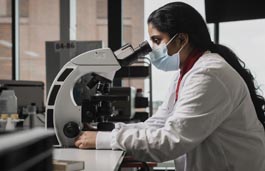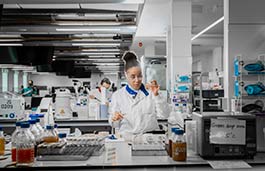Search
Pharmacology BSc (Hons)
Study level: Undergraduate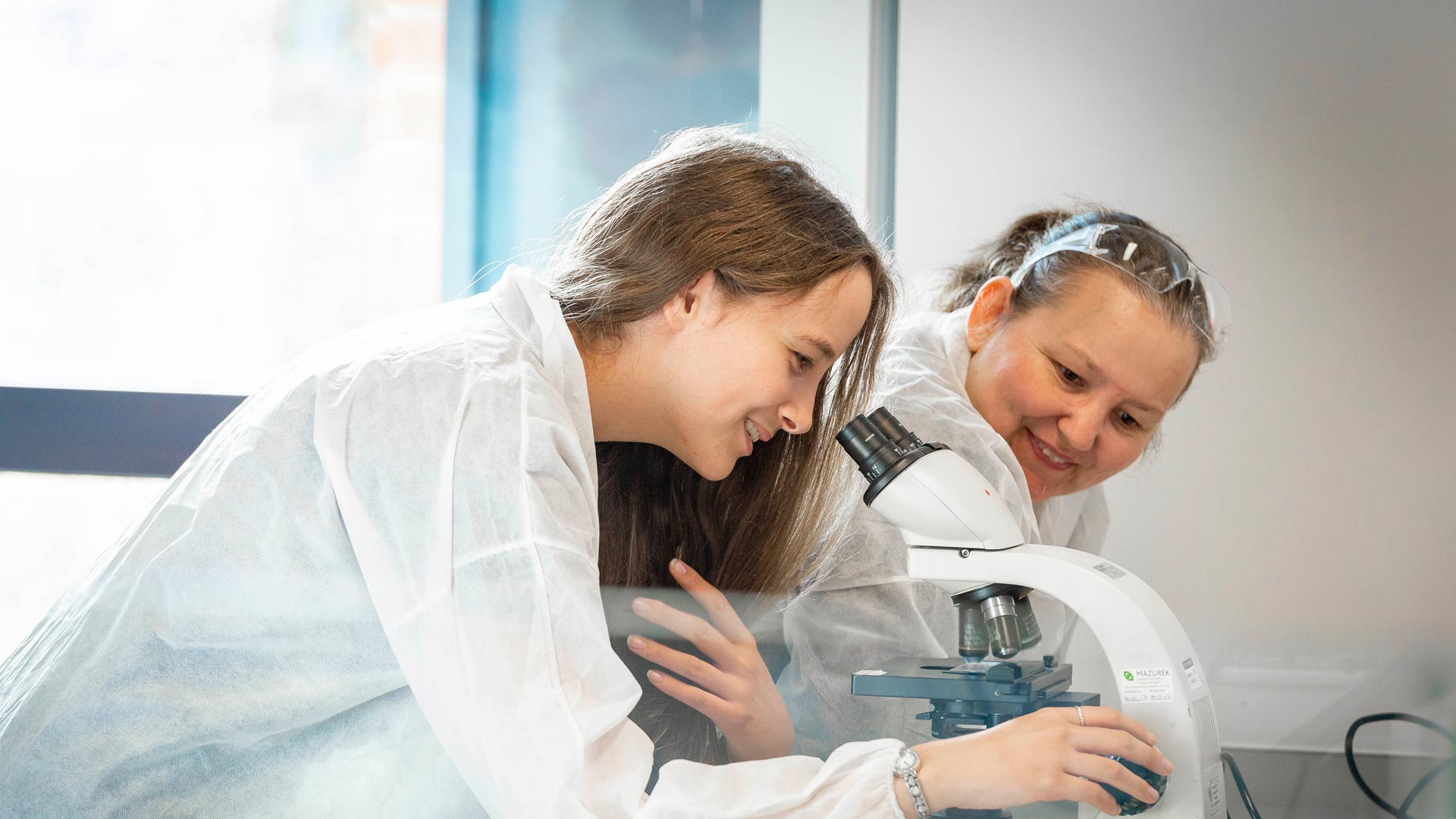
On our Pharmacology BSc (Hons) degree you will further your understanding of how our bodies function in both health and disease from molecules and cells to whole organ systems.
Course option
Year of entry
Location
Coventry University (Coventry)
Study mode
Full-time
Sandwich
Duration
3 years full-time
4 years sandwich
UCAS codes
BB92
Start date
September 2024
January 2025 - condensed
Course overview
Successful completion of this course will equip you with the skills and knowledge to contribute to current and emerging challenges in the understanding of drug actions and reactions and the development of new drugs to help fight disease.
- Not only will your studies focus on the investigation of how drugs are developed and their effects on living systems, but your studies will also take on a multidisciplinary approach incorporating aspects of human physiology, cell biology, biochemistry, genetics and molecular biology, underpinned by chemical principles.
- Upon successful completion, you will have the skills and knowledge to meet the demand for suitably trained professionals within the global pharmaceutical industry to expedite the critical task of translating basic laboratory medical research into technology and drugs that can be used to diagnose and treat patients.
- It is anticipated that on successful completion of this course you could have employment opportunities in a range of industries including pharmaceutical research and development roles, clinical trials, drug regulation and sales and marketing.
- The January start for this course is condensed in Year 1. Please see the ‘How you’ll learn’ section below for more details.
Rated Gold Overall
Teaching Excellence Framework (TEF) 20235 QS Stars for Teaching and Facilities
QS Stars University RatingsTop 5 Student City in England (Coventry)
QS Best Student Cities Index 2025Why you should study this course
- Hands-on experience for a wide range of laboratory techniques such as gene amplification using PCR, gene sequencing, cell culture, flow cytometry using real world applicable techniques and clinical simulations in our cutting edge Superlab4.
- Extensive industry links (e.g. Biocity) and opportunities to spend a year in industry in the UK or overseas as a placement student2; past students have worked at John Radcliffe Hospital and companies like Binding Site, and in countries as far afield as Canada, Spain and the Netherlands.
- Our experienced research active teaching team have worked within cardiovascular and respiratory pharmacology, clinical toxicology, NHS pathology laboratories. Staff bring their professional and research expertise into their teaching through the use of contemporary clinical case studies as the basis for problem-based learning activities (staff may be subject to change).
- This course would be ideal for students who wish to pursue careers in integrative medical and pharmacological science or are interested in focusing on drug development.
- Following British Pharmacological Society (BPS) guidelines, this course is designed to give you a solid foundation in areas of biology that support an understanding of pharmacology.
- If you choose to start this course in January you will study exactly the same course but over a slightly shorter timescale in Year 1. This is ideal if you missed the September start, want to transfer from a different university or course or just need a bit more time to prepare for life at university.
Accreditation and professional recognition
The degree is accredited1 and recognised by the following bodies:
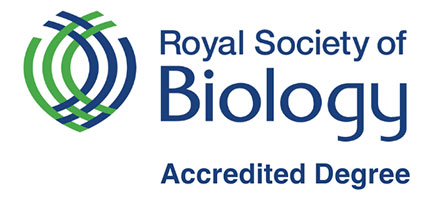
The Royal Society of Biology
This course is accredited by the Royal Society of Biology (RSB) up to and including September 2028 entry for the purpose of meeting in part the academic and experience requirement for the Membership and Chartered Biologist (CBiol). This programme has been accredited by the Royal Society of Biology following an independent and rigorous assessment. Accredited degree programmes contain a solid academic foundation in biological knowledge and key skills and prepare graduates to address the needs of employers. The accreditation criteria require evidence that graduates from accredited programmes meet defined sets of learning outcomes, including subject knowledge, technical ability and transferable skills.
Our Award-winning Green Superlab
With space for over 250 students and packed full of industry-standard equipment, the Coventry University Superlab is an amazing place to learn, experiment and discover. Find out what we’re doing in our Superlab to make it greener and reduce our waste and carbon emissions.
What you'll study
We regularly review our course content, to make it relevant and current for the benefit of our students. For these reasons, course modules may be updated.
How you'll learn
Throughout your studies, you will have the opportunity to develop a good knowledge of a range of disciplines and how they apply to human health and disease and how drugs are developed, work and used in the treatment of disease. Your learning experience will include a mix of both theory and lab-based classes.
During your degree you will have the opportunity to undertake challenging lab and non-lab based independent research projects, dealing with important life science research questions.
Teaching methods include:
- Lectures
- Seminars
- Presentations
- Projects
- Workshops
- Practical laboratory sessions, supported by an extensive suite of analytical and biological laboratories staffed by experienced technicians.
You will be allocated a dedicated Personal Academic Tutor for the duration of your course, with whom you can make an appointment whenever you need to; you can also arrange to see other members of staff in ‘drop in’ sessions for any additional help you may need.
If you choose to start this course in January it will be run as a condensed programme. You’ll start your course in January and finish your first year in August. Upon successful completion of Year 1, you will progress onto Year 2 in September and then continue to start subsequent years of your course in September, completing your degree at the same time as the September starters unless you opt to do a placement year.
Teaching contact hours
Depending on the year of study you will typically have between 9-18 hours of structured weekly teaching and learning hours which may include activities such as workshops, laboratories, online tutorials, seminars and lectures. This will be supported by a weekly course programme hour with your tutors. In addition, you will be expected to undertake around 18 hours of self-directed study each week.
The contact hours may be made up of a combination of face-to-face teaching, individual and group tutorials, and online classes and tutorials.
As an innovative and enterprising institution, the university may seek to utilise emerging technologies within the student experience. For all courses (whether on-campus, blended, or distance learning), the university may deliver certain contact hours and assessments via online technologies and methods.
Since COVID-19, we have delivered our courses in a variety of forms, in line with public authority guidance, decisions, or orders and we will continue to adapt our delivery as appropriate. Whether on campus or online, our key priority is staff and student safety.
Assessment
This course will be assessed using a variety of methods which will vary depending upon the module.
Assessment methods include:
- Phase tests
- Essays
- Group work
- Presentations
- Reports
- Projects
- Coursework
- Individual assignments
The Coventry University Group assessment strategy ensures that our courses are fairly assessed and allows us to monitor student progression towards achieving the intended learning outcomes.
International experience opportunities
Medical research takes place in higher education institutions, research institutes, hospitals and industry throughout the world. This international perspective is reflected in a number of modules on the course, which deal with issues of global importance, such as drug discovery and development from natural products including treatments for malaria, HIV/AIDS, tuberculosis and worm infections (helminths).
The course provides the opportunity for online collaboration with overseas institutions on a joint problem-based learning assignment. For example, previous students have joined others from University of Seville investigating the prevalence and approach to managing neurodegenerative disorders and the differing policies with regard to legal highs within the UK and Spain. Our sandwich degree option also allows a year’s work placement or study, which can be taken abroad2.
Please note that all international experience opportunities may be subject to additional costs, competitive application, availability and meeting applicable visa and travel requirements are therefore not guaranteed2.
One of the best parts of my job as an academic is to observe how our students develop and gain confidence as scientists and go on to succeed in their chosen degree and career pathway.
Sadie Dean, Course Director for Pharmacology BSc (Hons), 2022

Entry requirements
Typical offer for 2024/25 entry.
Not got the required grades? We offer this degree with an integrated foundation year.
Fees and funding
2024/25 tuition fees.
| Student | Full-time | Part-time |
|---|---|---|
| UK, Ireland*, Channel Islands or Isle of Man | £9,250 per year | Not available |
| EU | £9,250 per year with EU Support Bursary** £18,300 per year without EU Support Bursary** |
Not available |
| International | £18,300 per year | Not available |
If you choose to do a work placement2, you should consider travel and living costs to cover this. There is also a tuition fee3 of £1,250 that will cover your academic support throughout your placement year.
For advice and guidance on tuition fees and student loans visit our undergraduate finance page and see the University’s Tuition Fee and Refund Terms and Conditions.
We offer a range of international scholarships to students all over the world. For more information, visit our international scholarships page.
Tuition fees cover the cost of your teaching, assessments, facilities and support services. There may be additional costs not covered by this fee such as accommodation and living costs, recommended reading books, stationery, printing and re-assessments should you need them. Find out what's included in your tuition costs.
The following are additional costs not included in the tuition fees:
- Any optional overseas field trips or visits: £400+ per trip.
- Any costs associated with securing, attending or completing a placement (whether in the UK or abroad).
Condensed course – January start date
If you choose to start this course in January please make sure you check the Fees and Finance page for more information. Although starting this course in January does not prohibit you from being eligible for student finance, the way it is paid in your first year differs from those who start their course in September.
If you start the course in January, your tuition fees will be paid in accordance with the university’s Tuition Fees, Refund and Withdrawal Terms and Conditions for January starters and for any further years of study, your fees will be paid in accordance with the terms for September starters.
*Irish student fees
The rights of Irish residents to study in the UK are preserved under the Common Travel Area arrangement. If you are an Irish student and meet the residency criteria, you can study in England, pay the same level of tuition fees as English students and utilise the Tuition Fee Loan.
**EU Support Bursary
Following the UK's exit from the European Union, we are offering financial support to all eligible EU students who wish to study an undergraduate or a postgraduate degree with us full-time. This bursary will be used to offset the cost of your tuition fees to bring them in line with that of UK students. Students studying a degree with a foundation year with us are not eligible for the bursary.
Facilities
The course will be predominantly taught in the multi-million-pound Alison Gingell Building on the Coventry University main campus. It is home to microbiology, cell culture, molecular biology/genetics, biochemistry and forensic science laboratories, allowing you to work in a professional environment from day one4.
- Superlab: Our state-of-the-art SuperLab has facilities for cell culture and equipment for microscopy, DNA, RNA and protein analysis, and forensic testing.
- Analytical Chemistry Suite: Students apply their practical and theoretical knowledge to real-life working scenarios e.g. use of new generation chromatography technique to analyse products ranging from pharmaceutical agents to cosmetics, drinks and toxins.
- Physiology Suite: Separate physiology and health laboratory facilities enable the measurement of physiological parameters such as heart rate, blood pressure, lung function test and neuromuscular functioning.
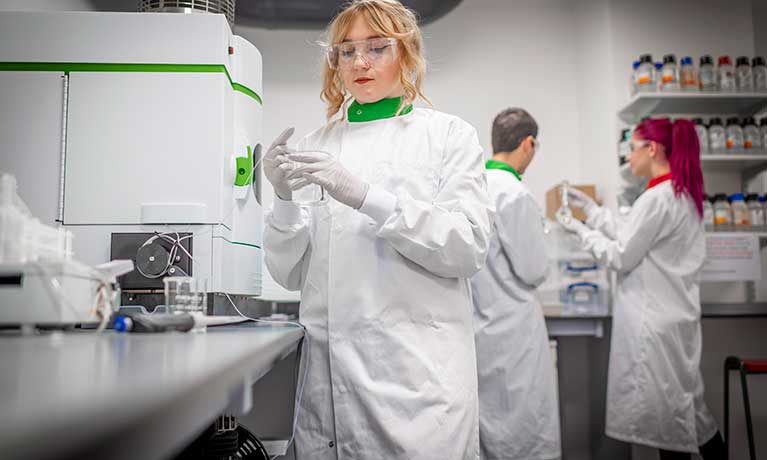
Alison Gingell Building
The Alison Gingell Building is home to microbiology, cell culture, molecular biology/genetics, biochemistry and forensic science laboratories, allowing you to work in a replicated professional environment from day one.
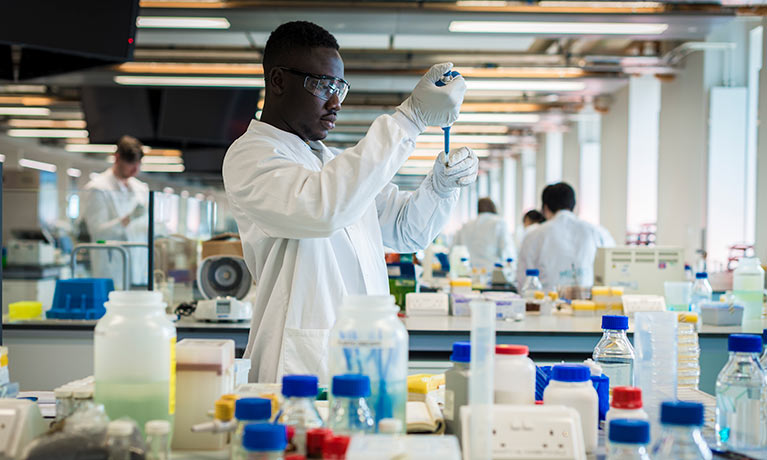
SuperLab
Our SuperLab has facilities for cell culture and equipment for microscopy, DNA, RNA and protein analysis, and forensic testing.
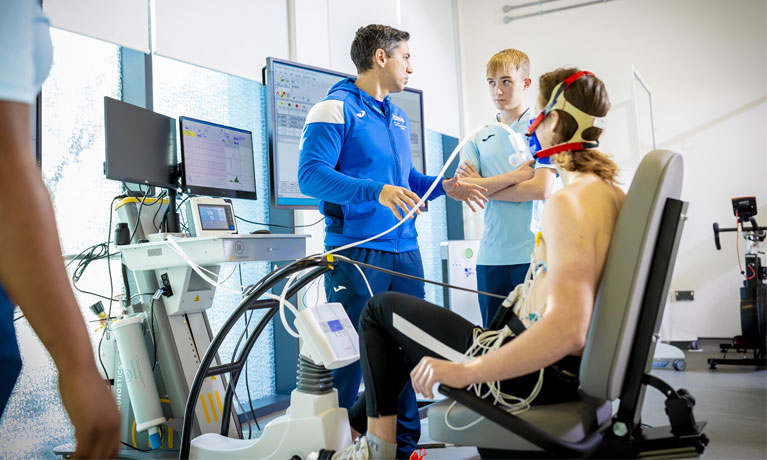
Physiology suite
Separate physiology and health laboratory facilities enable the measurement of physiological parameters such as heart rate, blood pressure, lung function test and neuromuscular functioning.
Careers and opportunities
A large number of medical scientists are employed by companies in the pharmaceutical industry, where they are involved in discovering and developing drugs and carrying out clinical trials. Medical scientists may also work for contract research organisations (CROs) or academic departments within universities on research projects. There are also career options within government laboratories (including environmental agencies), charity-funded research organisations, such as the Medical Research Council (MRC), and with other research institutes.
This course is specifically designed to provide you with the opportunity to develop the skills and knowledge required for a career in a range of sectors in a variety of roles in companies and organisations in both the UK and abroad. In addition to discipline specific theory and practical laboratory competence, you will also develop transferrable skills in digital fluency, numeracy, communication and teamwork.
The scientific knowledge and skills you acquire during the course can be a useful basis for a career in: teaching; technical and scientific writing (such as medical writing or writing for the media); clinical trials; drug registration, patenting or monitoring; medical publishing or other information services; regulatory affairs or sales and marketing.
Upon successful completion of your course, you will be equipped with the knowledge and hands on practical experience required from the scientific and pharmaceutical industries to maintain and advance their activities to meet the global challenges of health and disease. There is also a growing demand for highly skilled staff with the ability to work in multidisciplinary teams, right across industry, in the health service, government establishments, research and educational institutions and our degree is designed to give you a wide range of key skills that will be attractive to such employers.
Coventry University is committed to preparing you for your future career and giving you a competitive edge in the graduate job market. We provide a wide range of support services to help you plan and prepare for your career.
Where our graduates work
Our graduates have gone on to careers in drug discovery and development, clinical trials development and governance within the pharmaceutical industry and university and hospital departments. Recent examples include working as a regulatory strategist and trials manager for Pfizer, as an education administrator for Education for Health and as activities coordinator for the TLC group.
Further study
The course is an excellent foundation for further postgraduate studies leading to an MSc or PhD. We run a range or related taught MSc courses that allow our graduates to specialise in the area that they have a passion for and would like to pursue a career in. These courses also have a ‘with professional experience’ option, allowing students to apply for and complete an extended period of experience in a professional environment.
Graduate Immigration Route visa
Based on current information from the UK Government, international students whose study extends beyond summer 2021 may be eligible for a visa under the UK Government’s Graduate Immigration Route, which will enable students to stay and work, or look for work, in the UK at any skill level for up to two (2) years. Check the most up to date guidance available to check your eligibility and any updates from the UK Government before making an application or enrolment decision.
How to apply
You may also like

Biomedical Science/Applied Biomedical Science BSc (Hons)
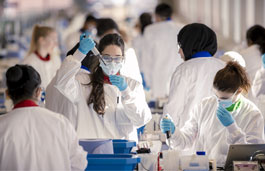
Human Biosciences BSc (Hons)
